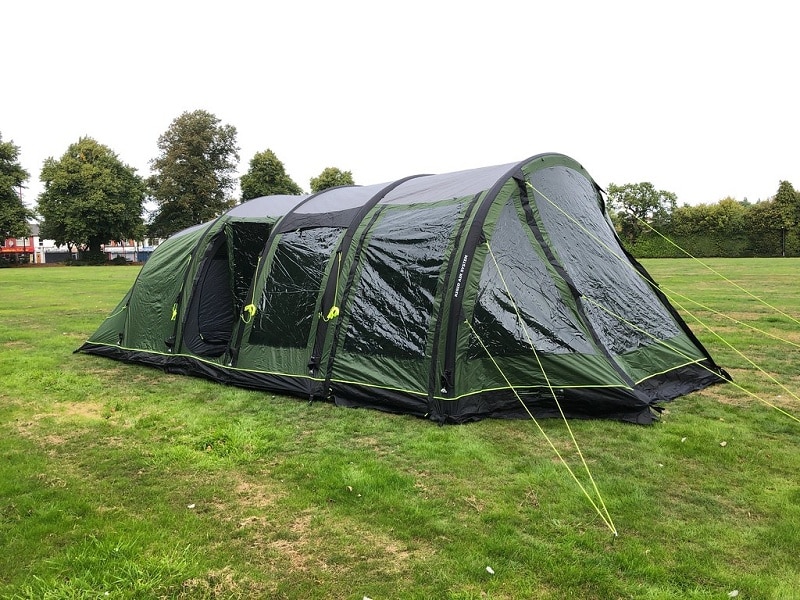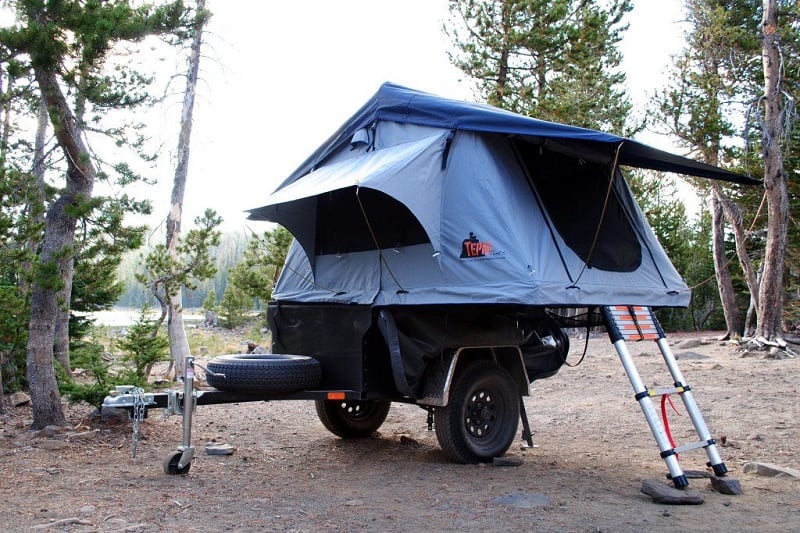[ad_1]
Were you aware that air tents are becoming more and more popular amongst campers in recent years? Many well-known brands like Coleman, Heimplanet, and Easy Camp manufacture air tents.
There are many reasons why air tents have become a significant contender amongst the various types of tents available in the camping market.
Should you happen to be interested in uncovering more about air tents before committing to purchasing one, you will likely find this article of interest.
Here’s The Answer To How Expensive Air Tents Are:
Air tent cost largely depends on the brand and size that you choose. Some brands are expensive, while others are cost-effective and affordable. On average, a two to three-person air tent costs between $150 and $750, and a four-person air tent costs between $900 and $2,000.

1. What Is An Air Tent?
If you’re a beginner camper, it’s likely that you don’t know too much about air tents but fear not as we have you covered, which is why we’re going to start by telling you exactly what this type of tent is.
First, unlike a traditional tent, an air tent is entirely pole-free. Air tents, otherwise known as inflatable tents, have built-in fully encased tubes where the air is pumped into to inflate the tent. You will notice that fiberglass or metal poles are used to assemble a tent with traditional tents instead of threading them through the skeleton of a tent.
You need to use an air pump to pump air into the tent’s structure with an air tent. Typically the tubes of an air tent are commonly referred to as air beams because of the first tent created by the brand Vargo who founded the immensely popular AirBeam tent line.
Not all air tents are inflated the same way.
Some air tents use a continuous flow system whereby you would need to inflate your tent by pumping air into one tube and allowing the entire structure to form, much like how you would inflate an air mattress.
Other air tents follow a cell structure form of inflation. This means that you would pump air through several different tubes, much like how you would inflate a pool toy that has multiple compartments.
Air tents come in many different types and have various uses. Often most air tents will be able to sleep anywhere between one to six people comfortably.
However, you should note that air tents tend to be pricier than traditional tents, and the more people they can sleep, the steeper their prices increase.
2. What Are Air Tents Ideal For?
It might be surprising, but air tents are ideal for all types of camping and during most seasons.
Yes, even in winter, you can use an air tent as long as you have bought one capable of four-season camping. Essentially, you can use an air tent if you’re traveling solo or with friends and family.
Additionally, you can also use this type of tent while backpacking, where you only stay somewhere for a night or two or for long stay camping adventures where you are pitched to stay for a weekend or two.
3. How Do Air Tents Stack Up Against Other Types Of Tents?
If air tents are becoming so popular, how do they compare against other types of tents?
To adequately explain how air tents stack up against the competitions, we thought it prudent to list a few of their known benefits. Hopefully, learning about these particular benefits will help you understand why air tents are just as good as typical tents and, in some instances, are even better than them.
Ease of Use:
Unlike traditional pole tents, air tents are much easier to use.
Although you have to inflate them with air, this process is much easier than threading poles.
On average, you can inflate an air tent in approximately 8 to 15 minutes, while it could take you up to an hour to pitch a standard tent that has poles.
You Cannot Overinflate Them:
If you’re too rigorous while setting up a poled tent, it can be easy for you to cause some damage.
A camper often puts a pole through their tent campus while setting it up.
With an air tent, you won’t have this issue as there is no risk of you overinflating your tent because it will have a maximum psi capability of around 11psi.
Excellent During Windy Conditions:
Since air tents don’t have poles, they can withstand incredible pressure and wind.
They will generally fair much better during stormy or windy conditions while camping because you don’t need to worry about any poles snapping while you’re safely cocooned in your tent.
4. Are Air Tents Popular Among Experienced Campers?
Air tents are reasonably popular amongst experienced campers and not just beginners.
The many benefits these tents exhibit, such as reliability, stability, ease of use, fast pitching times, and durability, make them great options.
Experienced camping families, in particular, tend to opt for air tents not only because they have fast pitching times but also because they can often withstand roughhousing and even rougher weather conditions.
5. How Heavy Are Air Tents Compared To Tents With Poles?
One of the biggest questions beginners have when deciding between a traditional tent, and an air tent is how heavy are air tents compared to tents with poles? Well, luckily, the answer to this question is relatively straightforward.
In most instances, an air tent that sleeps two, four, or six people will weigh less than a tent with poles that sleeps the same amount of people. However, you need to note that this isn’t always the case, as there are times when an air tent can weigh the same amount as a poled tent.
Often you will find that an air tent is lighter simply because it doesn’t have poles. The heaviest part of a tent is its poles. Although an air tent has more fabric instead of poles, it doesn’t necessarily make this type of tent heavier because these air compartments are empty tubes.
Let’s give you a real-world example so that you can see how much of a difference you could experience between an air tent and a tent with poles:
- Vango Osiris Air 500 five-person inflatable tent: 33.73 pounds.
- Vango Mokala 450 four-person poled tent: 35.05 pounds.
6. How Durable Are Air Tents?
Like poled tents, air tents can sustain damage if not taken care of and maintained, but you should not that air tents are incredibly durable. We know that might not seem to be the case, but we guarantee that this statement is true in most instances.
Air tents are less likely to break than poled tents because they are tough to puncture. This is because the part of an air tent that becomes inflated is made from thermoplastic polyurethane.
The properties of this material include resistance to abrasion and a slight elasticity which is why they do well during windy conditions.
7. Are Air Tents Better At Keeping You Warm At Night?
No one could blame you if you believed that air tents are incapable of keeping you warm at night.
After all, when you think of an air tent, it’s unlikely that a cozy environment comes to mind. You will likely be pleased to learn that air tents are just as capable of keeping you warm at night compared to traditional poled tents.
Despite being inflatable, they still utilize canvas and other materials that come standard in traditional pole tents. However, there are a few air tents that can keep you warmer at night than a standard tent.
Some air tents are made with climate control in mind. They have materials that allow the tent to adjust temperatures to suit the climate it is being used in.
An excellent example of the type of tent that does this is the Vango Anantara IV TC Air inflatable tent. This tent has been designed with climate pro windows which feature a three-layer window construction of mesh, PVC, and curtain.
Citations:
Guide To Camping With Air Beam Inflatable Tents


We would love to hear your thoughts! (PS: We read ALL feedback)
[ad_2]
Source link


